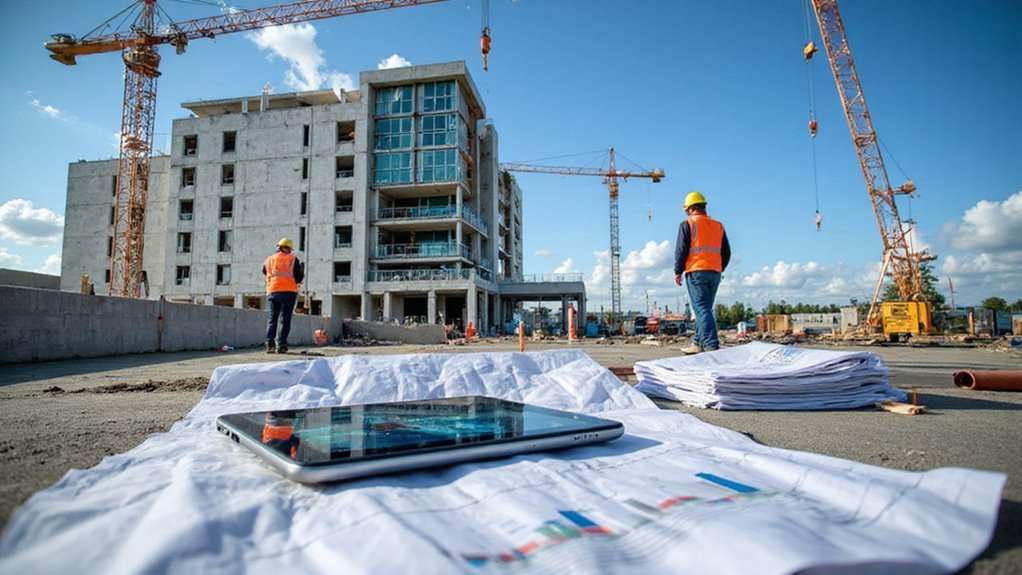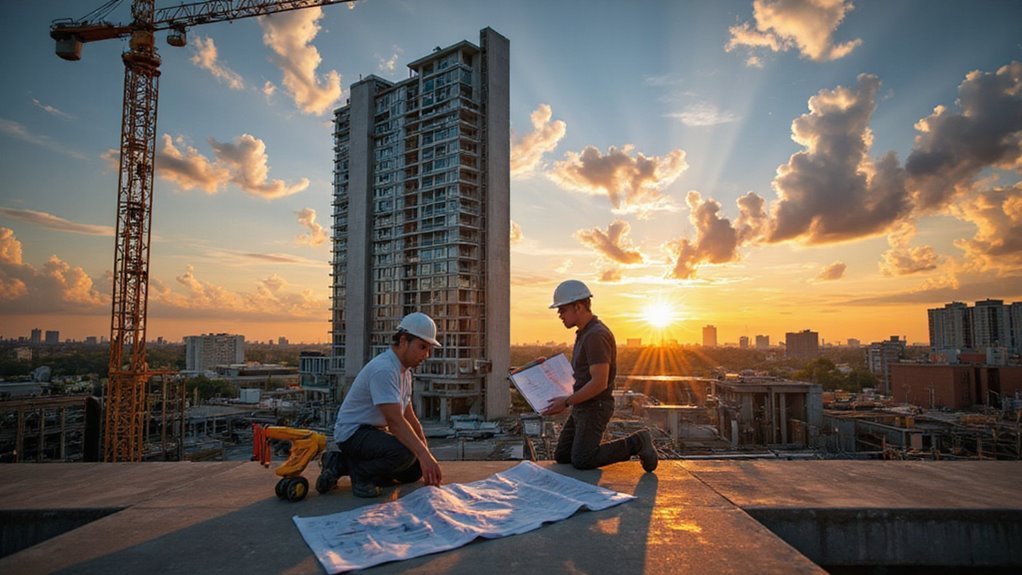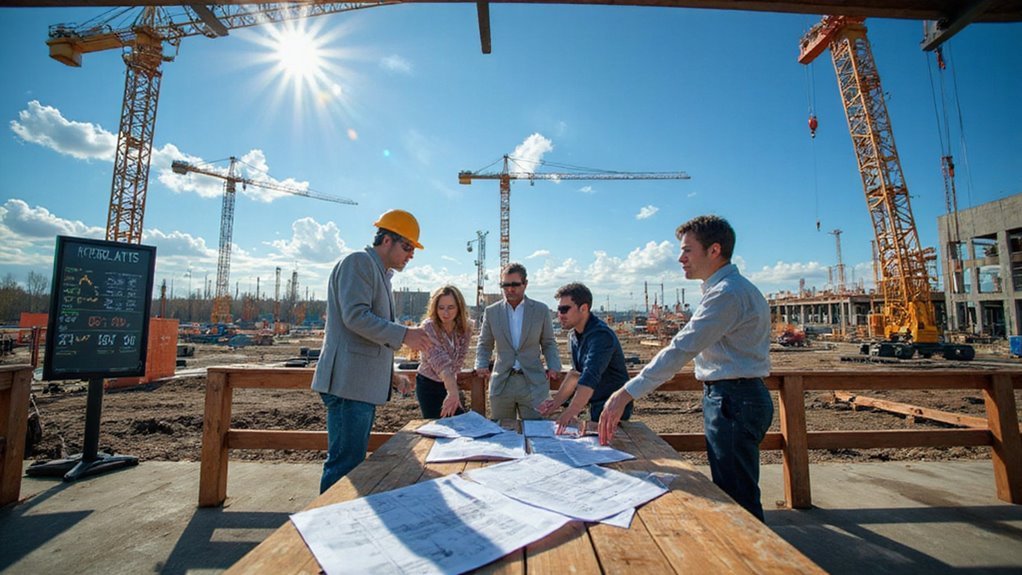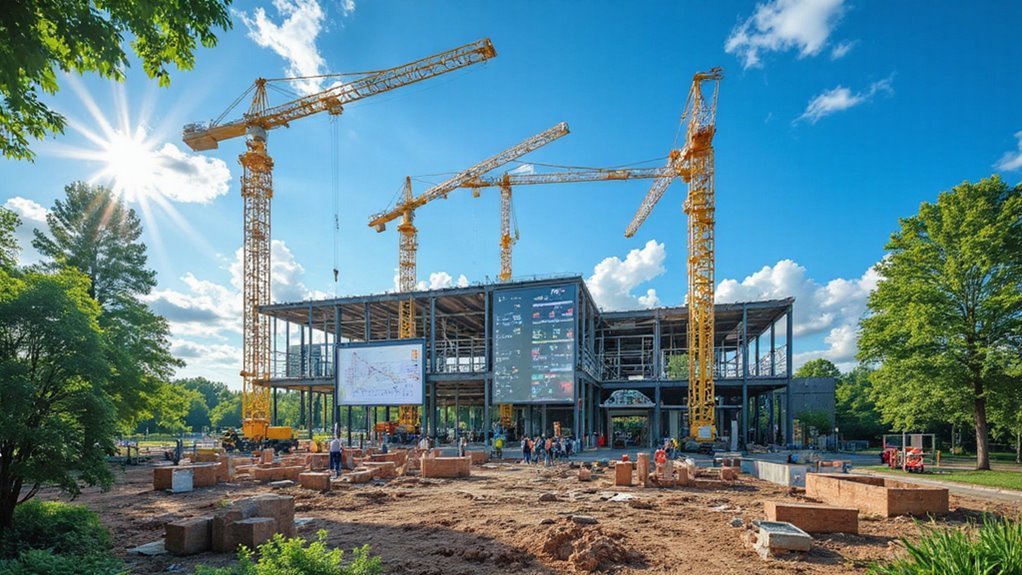Ready to fund your hotel construction? You’ll want lenders who understand the unique obstacles—think solid credit scores (usually 680+), thorough feasibility studies, and paperwork like permits and plans. Expect interest rates around 8%, with funds released as you hit construction milestones. Balancing hard and soft costs matters to keep lenders happy and avoid surprises. Nail your application, stay flexible through challenges, and you’ll smoothly shift to permanent financing. Keep going, and you’ll find out how to excel at each step from start to finish.
Key Takeaways
- Hotel construction loans typically have 1–3 year terms with interest rates around 8%, often converting to permanent financing of 5–7 years.
- Strong credit scores (680+) and detailed financial documentation significantly improve lender approval chances for hotel construction financing.
- Eligible projects must comply with zoning, building codes, and require confirmed feasibility analysis and strategic financing plans.
- Funds are disbursed in tranches based on completed construction milestones verified by inspections to control cash flow and risk.
- Partnering with specialized lenders and submitting a thorough, well-documented application accelerates project approval and funding success.
Understanding Eligible Hotel Construction Projects

Before you even break ground for your hotel project, you’ve got to understand what makes a hotel construction project eligible for financing—because hotel construction lenders won’t just throw millions at any blueprint on the table. Initially, you need to dominate compliance with zoning laws and building codes to dodge delays and legal headaches. Feasibility analysis is your crystal ball: it guarantees your site matches market demands and regulatory standards. For many projects, having a strategic plan for smart warehouse financing can also strengthen the overall financial outlook and lender confidence. Nail the project approval process by staying sharp on documentation—architectural plans, permits, environmental reports—all customized to local rules. Remember, approvals aren’t just paperwork obstacles; they’re your project’s green light. So, if you want lenders to back your vision, keep regulatory compliance tight and your feasibility analysis convincing. Understanding the hotel construction process helps you anticipate key milestones that lenders expect before releasing funds. This is the difference between funded dreams and dusty blueprints.
Key Loan Terms and Structures for Hotel Construction
Now that you’ve achieved mastery regarding what makes a hotel construction project eligible for financing, the time has come to tackle the nitty-gritty regarding the loan terms and structures that will actually get your project funded. Hotel construction loans typically run 1–3 years for building, then convert into longer loan terms—think 5 to 7 years—to help you shift smoothly to permanent financing. Interest rates can feel like a rollercoaster, often near 8%, in addition to fees and loan covenants, which are lender rules you’ll want to keep in alignment with (nobody likes surprises). Your capital stack might blend senior loans with creative financing structures like CPACE. Contractors can find construction project funding options that best suit the scale and timeline of their hotel project. Working closely with construction lenders to balance loan covenants and financing structures means you can innovate boldly without losing control or sleep. These loans usually provide funds in tranches aligned with construction milestones, helping manage cash flow while reducing lender risk.
Eligibility Criteria and Lender Requirements
Before lenders hand over millions, they’re going to want to see your credit score—and they’re not impressed by anything less than good. You’ll also need to put together some serious paperwork, like detailed financial statements that prove your project has long-term legs. Think about this as your project’s report card; the better this looks, the more confidence you inspire. A preferred credit score of 680 or higher is typically required to enhance your loan eligibility. Additionally, lenders often consider the time in business to assess the risk associated with your project.
Credit Score Minimums
When that comes in regard to hotel construction loans, your credit score is like your financial GPA—it can make or break your chances for securing funding. Lenders set credit score thresholds that directly impact approval, loan-to-value ratios, rates, and underwriting criteria. Here’s what you should know to innovate your approach:
- Commercial banks typically want a score of 680+ for hotel construction loans, while online lenders may start as low as 600 but sweeten the deal at 650+.
- Scores of 720 and above release better rates, higher loan-to-value, and smoother approval—your project deserves the VIP pass.
- Below 650? Expect tougher scrutiny, higher rates, and maybe a collateral brainstorming session.
In many construction loan programs, including FHA ones, a minimum credit score around 580 can sometimes qualify, but private lenders often require higher scores for commercial projects like hotels.
Required Financial Documentation
Here’s a snapshot of what lenders typically ask for:
| Documentation Type | Purpose | Why It Matters |
|---|---|---|
| Financial Statements | Show your financial health | Builds lender confidence |
| Project Plans | Detail construction progress | Proves your project’s real |
| Collateral & Appraisals | Secure the loan | Protects the lender’s interest |
| Business Plans | Outline strategy | Demonstrates your knowledge |
Prepare this paperwork well, and watch how it alters hotel construction loans from a gamble into a smart bet. Having a thorough checklist throughout this preparation ensures compliance and risk management is maintained effectively.
Types of Financing Available for Hotel Construction
When you’re building a hotel, picking the right construction loan is like choosing the right tool for the job—it can make all the difference. You’ll also want to understand bridge and takeout financing, which help you manage cash flow and plan for long-term stability without breaking a sweat. Let’s break down these options so you can see how each fits into your project’s financial puzzle.
Construction Loan Options
Five main types of construction financing alternatives can assist you in bringing your hotel project from dream into reality, each with its own perks and quirks. When applying for hotel construction loans, knowing your options enables you to pick smart financing aligned with your goals. Here are three innovative choices to contemplate:
- Traditional construction loans offer staged funding tied to milestones and require strong credit but usually lower rates.
- SBA construction loans provide long-term, low-down-payment options, perfect for small of medium projects needing stable hotel renovation financing.
- Mezzanine financing bridges the gap when lenders provide capital but you need more—think of it as a financial sidekick with higher rates but big flexibility.
Choosing the right mix means fewer headaches and a smoother path from blueprint to grand opening.
Bridge and Takeout Financing
Bridge and takeout financing are the financial life rafts that keep your hotel project afloat when shifting from construction toward long-term stability. When traditional hotel construction loans wrap up, construction takeout bridge loans step in to pay off those short-term debts, offering you flexible financing to ease the change. These bridge loans give you immediate funding for renovation or stabilization, helping you move quickly in a competitive market. Additionally, non-recourse options mean you can protect your personal assets—because who needs extra stress? Though they come with higher rates, their speed and flexibility make them perfect for innovative developers ready to adjust. So, whether you’re revamping a property or locking in long-term capital, bridge and takeout financing keep your hotel dreams sailing smoothly.
The Hotel Construction Loan Application Process
How do you transform your hotel dream into solid financing? It all begins when you submit your application — the crucial primary step for hotel construction loans. Lenders plunge profoundly, evaluating total project risk, reviewing your loan terms and interest rates, and scrutinizing required documentation. Expect a thorough application review and underwriting process that usually takes 30–60 intervals. To ace this, focus on:
- Formulating a detailed business plan with market analysis and financials
- Assembling all documentation—like construction blueprints and permits
- Demonstrating your experience and equity in the project
This process isn’t just paperwork; it’s a strategic dance to secure project approval. Nail it, and you’re one step closer to breaking ground on innovation—not just another hotel, but your vision realized. Be prepared for evolving market conditions, as the hotel construction pipeline is experiencing record growth across multiple segments in 2024.
Managing Construction Loan Disbursements and Draws

While securing your hotel construction loan is a major win, managing how those funds flow during the build is where the real challenge—and opportunity—lies. You’ll rely on a carefully designed draw schedule to align financing with project milestones, keeping construction moving smoothly without cash pileups or shortfalls. Each disbursement is like passing a checkpoint; inspections confirm the work’s done right before funds hit the contractor’s account. Effective communication is your secret weapon here—regular updates with your lender keep everyone in sync and delays at bay. Think about it as an innovative dance: adjust the draw schedule if timelines shift and keep contingency funds handy. Nail this, and you’ll turn a complex financing tango into a well-choreographed success story. Understanding the key loan options available for property development can also help tailor the financing structure to your specific hotel project needs.
Hard Costs vs. Soft Costs in Hotel Construction Financing
When financing a hotel, it’s essential to know the difference between hard costs—those hands-on expenses like materials and labor—and soft costs, which cover things like permits, design, and fees that sneak in before and after the heavy lifting. You’ll want a clear strategy because these costs behave differently and need different funding approaches. Understanding them helps you keep your budget in line and your lender confident that you’re running a tight ship, not just hoping for the best. Exploring various lenders for property and land development finance can help tailor funding solutions to cover both cost types effectively.
Defining Hard Costs
Hard costs are the nuts and bolts within hotel construction financing—you can’t build a hotel without them, literally. These tangible expenses make up the lion’s share of your capital needs and are key for securing hotel construction loans and project approval. When lenders explore underwriting, they laser-focus on hard costs—they want to see solid numbers tied to real materials, labor, and equipment, not just ideas floating in the commercial real estate ether.
Here’s what you need to know:
- Hard costs include everything from concrete foundations to fire alarms, the real physical work on-site.
- They typically make up 65–75% of your total construction budget—yeah, that’s a big chunk!
- Managing these costs well shows lenders you’re serious, enhancing your chances for smooth hotel financing.
Conquer hard costs, and you control your build.
Understanding Soft Costs
Think about soft costs as the backstage crew in your hotel construction project—they don’t build the walls, but they make sure everything runs smoothly behind the scenes. These soft costs—think design fees, permits, insurance, and legal charges—can clock in at about 12% of your total budget. Overlooking them? That’s like forgetting the script while directing a play. Smart project management means using budgeting tools to nail accurate cost estimates early, helping you avoid nasty surprises. Managing soft costs well not only controls your financial impact but also supports risk mitigation by keeping you compliant and in line with your schedule. So, treat these invisible expenses as your project’s secret sauce—they balance out hard costs and help your hotel construction innovate without blowing the budget.
Financing Strategies Overview
Since you’re stepping into the realm of hotel construction financing, it is crucial to understand how the dollars break down between what you can literally touch and what keeps the project sailing behind the scenes. Hard costs cover physical items—materials, labor, equipment—mostly about 65-75% of your budget. Soft costs? Think design fees, permits, legal matters. Here’s what you need to know:
- Hard costs build your hotel’s frame and guts, so accurate budgeting here drives lender confidence.
- Soft costs, while less tangible, still need secured financing to keep hotel development running smoothly.
- Innovative financing strategies, including hotel construction loans non recourse, often focus loan amounts on hard costs initially.
Mastering this division makes your financing smarter and your project more resilient.
Risks and Challenges Associated With Hotel Construction Loans
Even the best-laid hotel construction plans can hit bumps in the road, and if you’re not ready, those bumps can feel more like potholes. You face revenue volatility right from day one—room rates and occupancy can swing wildly, messing with your cash flow. The construction phase? It’s a complex building process loaded with risks—delays, cost overruns, supply chain headaches—that can throw off your timeline and budget. Lenders today are pickier than ever (hello, lender selectivity), demanding heftier equity requirements and watching interest rate increases like hawks. Market fluctuations only add to the uncertainty, making it harder to predict your project’s success. Steering through these challenges means thinking creatively and staying agile—because in hotel construction, the only thing constant is change. Securing the right financing often depends on a thorough understanding of financing commercial real estate projects and aligning your strategy accordingly.
How to Improve Approval Chances for Hotel Construction Loans

While landing a hotel construction loan can feel like trying to crack a secret code, understanding exactly what lenders seek can give you a major advantage. You’ll need a sharp business plan that clearly defines your project scope and includes a solid market analysis. Don’t forget to score well on your credit score—lenders love a strong financial history. Creating a thorough feasibility study proves your project isn’t just a dream but a viable investment.
Here are three ways to enhance your approval chances:
- Partner with specialized lenders who understand hotel quirks and offer customized terms.
- Build a polished application package that highlights your strengths and plans.
- Nail every detail from market analysis to project scope—show you mean business.
With this approach, you’ll turn those “no’s” into “let’s build!”
Transitioning From Construction Loans to Permanent Financing
Getting a hotel construction loan approved is a big win, but this is just the beginning of your financing expedition. The real magic happens in your shift from construction loans to permanent financing. Think of it as a relay race where smooth handoffs are everything. Structured financing solutions like construction-to-permanent loans let you avoid multiple approvals, cutting down paperwork and reducing transaction costs—quite the time saver! But don’t forget those completion requirements: all construction must wrap up cleanly, and liens need settling before you convert. Smart financial planning is essential since your monthly payments jump when you start repaying principal. Nail this shift, and you secure long-term stability with locked interest rates—now that’s a finish line worth sprinting toward!






